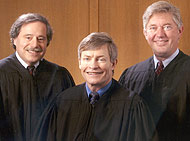Article from: www.thenewspaper.com/news/23/2333.asp
4/21/2008
Alaska: Appeals Court Cracks Down on Coercive Searches
Alaska Court of Appeals ruling uses state law to protect the rights of motorists from unwarranted police searches during traffic stops.
 The Alaska Court of Appeals on Friday put law enforcement agencies on notice that it would not tolerate "implicitly coercive" search requests during traffic stops. The warning came in the form of a ruling on the case of Susan S. Brown, a driver pulled over on November 24, 2004 allegedly because of the light illuminating her car's rear license plate was dirty.
The Alaska Court of Appeals on Friday put law enforcement agencies on notice that it would not tolerate "implicitly coercive" search requests during traffic stops. The warning came in the form of a ruling on the case of Susan S. Brown, a driver pulled over on November 24, 2004 allegedly because of the light illuminating her car's rear license plate was dirty.
On that night, Alaska State Trooper Maurizio Salinas never explained to Brown the reason for the stop, nor that he had no intention of issuing a ticket. Instead, Salinas convinced Brown to allow him to search her car and her body -- even though Brown had no warrants and showed no signs of illegal conduct. Salinas testified that his policy was to conduct as many random searches as possible during traffic stops. In this case, Salinas discovered a crack pipe hidden in Brown's coat. Speaking for the unanimous court, Judge David Mannheimer found that such search requests not based upon any reasonable suspicion of criminal conduct abused the rights of motorists.
"The routine traffic stop has become the doorway to widespread and probing searches of persons, vehicles, and luggage," Mannheimer wrote. "The Fourth Amendment, as interpreted by the United States Supreme Court, and as applied by various federal circuit courts and state courts, offers little protection to motorists in this situation."
The court puzzled over why a guilty motorist would be as likely as an innocent motorist to consent to a search that was clearly not in the driver's self-interest. The court noted New Jersey Supreme Court statistics that showed 95 percent of motorists consented to search requests and that 80 percent of those who did so were eventually found to be wholly innocent. The appeals court determined that the most likely explanation was that motorists do not believe that they can answer "no" to the search request without suffering negative consequences.
"Motorists who have been stopped for traffic infractions do not act from a position of psychological independence when they decide how to respond to a police officers request for a search," Mannheimer wrote. "Because of the psychological pressures inherent in the stop, and often because of the motorists' ignorance of their rights, large numbers of motorists guilty and innocent alike accede to these requests."
Mannheimer went on to explain that allowing coercive search requests to be made for anyone stopped for any traffic offense would, in effect, give police the ability to perform searches on any person at any time.
"It is virtually impossible to drive a motor vehicle in this country and not unwittingly commit some infraction of the motor vehicle laws," Mannheimer wrote. "And because motorists who are stopped for traffic infractions often accede to a police officers request for permission to search, the Fourth Amendment rules governing traffic stops create the potential risk that law enforcement officers will... search dozens, and perhaps hundreds, of people and vehicles each day even though the officers lack any grounds to justify these searches."
The court found that federal funding motivates searches that have a negative effect on the innocent.
"As part of the war on drugs, police officers have been encouraged to include such questions and requests as a routine component of traffic stops," Mannheimer wrote. "Because drugs are easily concealed in crevices, behind paneling, and under seats and carpeting, a search for drugs can be a painstaking business. Motorists often wait by the roadside [while] their vehicles are ransacked a process that typically takes twenty to forty minutes."
The US Supreme Court's current interpretation of the Fourth Amendment in these situtations focuses on two primary issues: whether a traffic stop takes an unreasonable amount of time and whether the consent given to a search is voluntary. Since the question posed to Brown only took twelve additional seconds of her time, it passes the first federal test. The appeals court also concedes that the "totality of the circumstances" test suggests Brown's consent fits the supreme court's understanding of voluntary. Because of this, the Appeals Court turned to state law to "protect motorists." The state constitution explicitly protects the privacy of citizens.
"The facts of this case present an example of an apparently ongoing and unjustified infringement of the privacy rights of Alaska citizens," Mannheimer wrote. "We therefore conclude that Article I, Section 14 of the Alaska Constitution must be interpreted to grant broader protections than its federal counterpart in situations like this."
A full copy of the decision is available in a 140k PDF file at the source link below.
Source: Brown v. Alaska (Alaska Court of Appeals, 4/18/2008)
Permanent Link for this item
Return to Front Page
 The Alaska Court of Appeals on Friday put law enforcement agencies on notice that it would not tolerate "implicitly coercive" search requests during traffic stops. The warning came in the form of a ruling on the case of Susan S. Brown, a driver pulled over on November 24, 2004 allegedly because of the light illuminating her car's rear license plate was dirty.
The Alaska Court of Appeals on Friday put law enforcement agencies on notice that it would not tolerate "implicitly coercive" search requests during traffic stops. The warning came in the form of a ruling on the case of Susan S. Brown, a driver pulled over on November 24, 2004 allegedly because of the light illuminating her car's rear license plate was dirty.